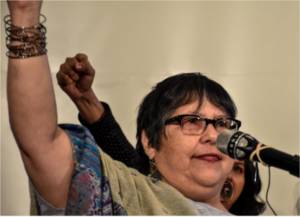Political Prisoners Teach-In: Mumia, migrant rights and cages
These slightly edited remarks were made April 24 at the “U.S. Empire vs. Political Prisoners” teach-in webinar sponsored by Mobilization4Mumia and held in honor of the 66th birthday of political prisoner and revolutionary Mumia Abu-Jamal, incarcerated for 39 years by the U.S. state.

Teresa Gutierrez
First of all, happy birthday to our comrade and leader Mumia Abu-Jamal! I want to talk very briefly about my experience as an im/migrant rights activist and its relationship to the struggle for Mumia.
I was born in Texas, so the issue of immigration is part of our DNA. We often say that we didn’t cross the border, the border crossed us — in my case, because we were here when Texas was stolen from Mexico. When the immigrant rights movement burst on the scene in 2006, that became my main area of work.
But back in the day, I was extremely impacted by the Black Liberation struggle as a young Chicana in Texas. So the case of Mumia and of other liberation activists has also always been part of my DNA.
In 2006, the immigrant struggle burst into the political scene, and we struggled to defend immigrants day in and day out. May Day was an action that immigrants revived in the United States. There had been many efforts by the Million Workers March and others to revive May Day, actions separate from the mainstream, but immigrants revived Mayday in 2006, which was great. It was an important independent action of workers.
The main emphasis, of course, was against the deportations, for migrant rights and so forth. I was proud to be part of the immigrant sector as that movement very much understood the importance of all immigration rallies bringing in other issues. To bring in the issue of wars abroad, to bring in the issues of police terror in Black and Brown neighborhoods, and so forth.
I found it so deeply moving to be in immigration coalition meetings where we had to say there’s an important case of Mumia Abu-Jamal, who was an activist. We would have to explain, as 99 percent of immigrant activists did not know who he was. But once we broke it down, it was like, okay, we get it!
And of course, to Mumia’s credit, he would always write statements on the immigrant struggle and the May Day struggle, so we were able to share that. And of course, he always wrote about U.S. imperialism and Latin America. So it was very easy for us to make that connection.
Connecting the struggles
Fast forward to 2016 when Trump — or as we call him “pendejo” [foolish person] — ran his racist campaign for presidency built on anti-immigrant, anti-Mexican hatred. It was a vicious dog whistle to the reactionaries, to the right wing, to the white supremacists — and he got elected on that basis. Then the war of terror really escalated against immigrants.
One thing we have to say that the struggle for migrant rights has in common with the struggle of our political prisoners is the tenacity and the inspiration that these sisters and brothers and family give us every single day. There have been deportations, there have been cages, there’s sickness, there’s death.
There are the caravans that we see of children and young people, of our grandparents, of men and women, and of trans people who are walking over 2,000 miles from Central America to come to the border.
We see these very difficult conditions come out of U.S. imperialism’s economic policies and foreign policies. And our hearts break with all of this. But they can throw everything against us, and migrants continue to struggle, continue to organize. They are here, and they are not going to leave. Just last weekend in Los Angeles, there were 200 cars in a caravan demanding stimulus aid for the undocumented and other low-paid workers.
So they may try to cage us, but like Mumia, we will continue to struggle. Happy birthday, Mumia, and thank you so much for everything that you stand for. Thank you so very much.

